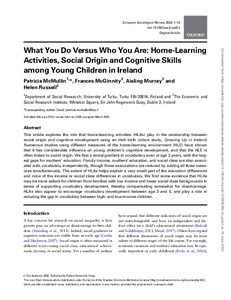What You Do Versus Who You Are: Home-Learning Activities, Social Origin and Cognitive Skills among Young Children in Ireland
Patricia McMullin; Frances McGinnity; Aisling Murray; Helen Russell
https://urn.fi/URN:NBN:fi-fe2021042827660
Tiivistelmä
This article explores the role that home-learning activities (HLAs) play in the relationship between social origin and cognitive development using an Irish birth cohort study, Growing Up in Ireland. Numerous studies using different measures of the home-learning environment (HLE) have shown that it has considerable influence on young children’s cognitive development, and that the HLE is often linked to social origin. We find a social gradient in vocabulary even at age 3 years, with the largest gaps for mothers’ education. Family income, mothers’ education, and social class are also associated with vocabulary independently, though these associations are reduced by adding all three measures simultaneously. The extent of HLAs helps explain a very small part of the education differences and none of the income or social class differences in vocabulary. We find some evidence that HLAs may be more salient for children from families with low income and lower social class backgrounds in terms of supporting vocabulary development, thereby compensating somewhat for disadvantage. HLAs also appear to encourage vocabulary development between age 3 and 5, and play a role in reducing the gap in vocabulary between high- and low-income children.
Kokoelmat
- Rinnakkaistallenteet [29335]
